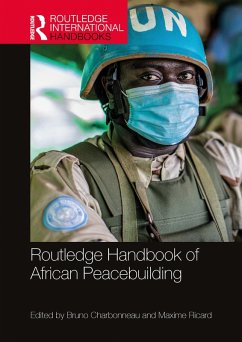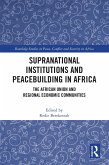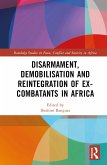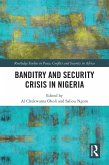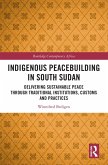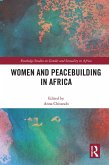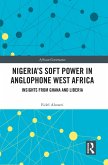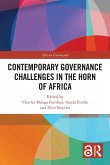Routledge Handbook of African Peacebuilding (eBook, ePUB)
Redaktion: Charbonneau, Bruno; Ricard, Maxime
45,95 €
45,95 €
inkl. MwSt.
Sofort per Download lieferbar

23 °P sammeln
45,95 €
Als Download kaufen

45,95 €
inkl. MwSt.
Sofort per Download lieferbar

23 °P sammeln
Jetzt verschenken
Alle Infos zum eBook verschenken
45,95 €
inkl. MwSt.
Sofort per Download lieferbar
Alle Infos zum eBook verschenken

23 °P sammeln
Routledge Handbook of African Peacebuilding (eBook, ePUB)
Redaktion: Charbonneau, Bruno; Ricard, Maxime
- Format: ePub
- Merkliste
- Auf die Merkliste
- Bewerten Bewerten
- Teilen
- Produkt teilen
- Produkterinnerung
- Produkterinnerung

Bitte loggen Sie sich zunächst in Ihr Kundenkonto ein oder registrieren Sie sich bei
bücher.de, um das eBook-Abo tolino select nutzen zu können.
Hier können Sie sich einloggen
Hier können Sie sich einloggen
Sie sind bereits eingeloggt. Klicken Sie auf 2. tolino select Abo, um fortzufahren.

Bitte loggen Sie sich zunächst in Ihr Kundenkonto ein oder registrieren Sie sich bei bücher.de, um das eBook-Abo tolino select nutzen zu können.
This timely new handbook surveys and analyses peacebuilding as it operates in this specifically African context. Bringing together an international line up of expert contributors, this book will be an essential read for students and scholars of African politics, post-conflict reconstruction, security and peace and conflict studies.
- Geräte: eReader
- mit Kopierschutz
- eBook Hilfe
Andere Kunden interessierten sich auch für
![Supranational Institutions and Peacebuilding in Africa (eBook, ePUB) Supranational Institutions and Peacebuilding in Africa (eBook, ePUB)]() Supranational Institutions and Peacebuilding in Africa (eBook, ePUB)41,95 €
Supranational Institutions and Peacebuilding in Africa (eBook, ePUB)41,95 €![Disarmament, Demobilisation and Reintegration of Ex-Combatants in Africa (eBook, ePUB) Disarmament, Demobilisation and Reintegration of Ex-Combatants in Africa (eBook, ePUB)]() Disarmament, Demobilisation and Reintegration of Ex-Combatants in Africa (eBook, ePUB)41,95 €
Disarmament, Demobilisation and Reintegration of Ex-Combatants in Africa (eBook, ePUB)41,95 €![Banditry and Security Crisis in Nigeria (eBook, ePUB) Banditry and Security Crisis in Nigeria (eBook, ePUB)]() Banditry and Security Crisis in Nigeria (eBook, ePUB)41,95 €
Banditry and Security Crisis in Nigeria (eBook, ePUB)41,95 €![Indigenous Peacebuilding in South Sudan (eBook, ePUB) Indigenous Peacebuilding in South Sudan (eBook, ePUB)]() Winnifred BedigenIndigenous Peacebuilding in South Sudan (eBook, ePUB)41,95 €
Winnifred BedigenIndigenous Peacebuilding in South Sudan (eBook, ePUB)41,95 €![Women and Peacebuilding in Africa (eBook, ePUB) Women and Peacebuilding in Africa (eBook, ePUB)]() Women and Peacebuilding in Africa (eBook, ePUB)43,95 €
Women and Peacebuilding in Africa (eBook, ePUB)43,95 €![Nigeria's Soft Power in Anglophone West Africa (eBook, ePUB) Nigeria's Soft Power in Anglophone West Africa (eBook, ePUB)]() Fidel AboweiNigeria's Soft Power in Anglophone West Africa (eBook, ePUB)41,95 €
Fidel AboweiNigeria's Soft Power in Anglophone West Africa (eBook, ePUB)41,95 €![Contemporary Governance Challenges in the Horn of Africa (eBook, ePUB) Contemporary Governance Challenges in the Horn of Africa (eBook, ePUB)]() Contemporary Governance Challenges in the Horn of Africa (eBook, ePUB)41,95 €
Contemporary Governance Challenges in the Horn of Africa (eBook, ePUB)41,95 €-
-
-
This timely new handbook surveys and analyses peacebuilding as it operates in this specifically African context. Bringing together an international line up of expert contributors, this book will be an essential read for students and scholars of African politics, post-conflict reconstruction, security and peace and conflict studies.
Dieser Download kann aus rechtlichen Gründen nur mit Rechnungsadresse in A, B, BG, CY, CZ, D, DK, EW, E, FIN, F, GR, HR, H, IRL, I, LT, L, LR, M, NL, PL, P, R, S, SLO, SK ausgeliefert werden.
Produktdetails
- Produktdetails
- Verlag: Taylor & Francis eBooks
- Seitenzahl: 308
- Erscheinungstermin: 30. Mai 2022
- Englisch
- ISBN-13: 9780429594618
- Artikelnr.: 63752106
- Verlag: Taylor & Francis eBooks
- Seitenzahl: 308
- Erscheinungstermin: 30. Mai 2022
- Englisch
- ISBN-13: 9780429594618
- Artikelnr.: 63752106
- Herstellerkennzeichnung Die Herstellerinformationen sind derzeit nicht verfügbar.
Bruno Charbonneau is Full Professor of International Studies and Director of the Centre for Security and Crisis Governance (CRITIC) at Canada's Royal Military College Saint-Jean. Maxime Ricard is West Africa Researcher at the Institute for Strategic Research (Institut de recherche stratégique de l'École militaire, IRSEM, France) and holds a PhD in political science from Université du Québec à Montréal. He is also Associate Researcher at the Centre FrancoPaix of the Raoul-Dandurand Chair in Canada.
Introduction: Whose Peacebuilding? Power, Politics, Practices Part I:
Institutions 1. From Peacekeeping to Peacebuilding: Towards a UN Peace
Continuum 2. The United Nations and the African Union: Partners or Rivals
in Peace Operations? 3. Peacebuilding via Security Sector Reform and
Governance? The Case of West Africa 4. Preventing Conflict-Induced Forced
Displacement in Africa: UNHCR, the AU and the Rhetoric and Realities of
'Root Causes' Part II: Themes and Debates 5. African Mediation in
High-Intensity Conflict: How African? 6. Justice and Reconciliation in
Africa: The Emergence of the African Union Transitional Justice Policy 7.
The Politics of Knowledge and an African Transitional Justice: Analysing
Africa as a Constitutive Outside 8. Local Peacebuilding: The Reflexive
Encounter Between a Subaltern View and a Practitioner in Côte D'Ivoire 9.
Women, Gender and Peacebuilding in Africa 10. Development and Peacebuilding
11. Peacebuilding and Democracy in Africa 12. The Climate Crisis and Its
Challenges for African Peacebuilding Part III: Case Studies 13. Peace by
Delegation? The G5 Sahel's Quest to Build Sustainable Peace 14.
Counterinsurgency and Peacebuilding in Somalia and Mali 15. Peacebuilding
in The Gambia: Sustaining the Gains and Addressing Potential Threats to the
Process 16. The Politics of Transitional Justice and Peacemaking in a
Non-Transition Context: The Case of South Sudan 17. Peacebuilding in
Guinea-Bissau: Challenges and the Way Forward to Sustaining Peace and
Security 18. Stability for Whom and for What? The Ivorian Peacebuilding
Experience Under Alassane Ouattara Conclusion: African Peacebuilding for
Whom and What? Bringing the People Back In
Institutions 1. From Peacekeeping to Peacebuilding: Towards a UN Peace
Continuum 2. The United Nations and the African Union: Partners or Rivals
in Peace Operations? 3. Peacebuilding via Security Sector Reform and
Governance? The Case of West Africa 4. Preventing Conflict-Induced Forced
Displacement in Africa: UNHCR, the AU and the Rhetoric and Realities of
'Root Causes' Part II: Themes and Debates 5. African Mediation in
High-Intensity Conflict: How African? 6. Justice and Reconciliation in
Africa: The Emergence of the African Union Transitional Justice Policy 7.
The Politics of Knowledge and an African Transitional Justice: Analysing
Africa as a Constitutive Outside 8. Local Peacebuilding: The Reflexive
Encounter Between a Subaltern View and a Practitioner in Côte D'Ivoire 9.
Women, Gender and Peacebuilding in Africa 10. Development and Peacebuilding
11. Peacebuilding and Democracy in Africa 12. The Climate Crisis and Its
Challenges for African Peacebuilding Part III: Case Studies 13. Peace by
Delegation? The G5 Sahel's Quest to Build Sustainable Peace 14.
Counterinsurgency and Peacebuilding in Somalia and Mali 15. Peacebuilding
in The Gambia: Sustaining the Gains and Addressing Potential Threats to the
Process 16. The Politics of Transitional Justice and Peacemaking in a
Non-Transition Context: The Case of South Sudan 17. Peacebuilding in
Guinea-Bissau: Challenges and the Way Forward to Sustaining Peace and
Security 18. Stability for Whom and for What? The Ivorian Peacebuilding
Experience Under Alassane Ouattara Conclusion: African Peacebuilding for
Whom and What? Bringing the People Back In
Introduction: Whose Peacebuilding? Power, Politics, Practices Part I:
Institutions 1. From Peacekeeping to Peacebuilding: Towards a UN Peace
Continuum 2. The United Nations and the African Union: Partners or Rivals
in Peace Operations? 3. Peacebuilding via Security Sector Reform and
Governance? The Case of West Africa 4. Preventing Conflict-Induced Forced
Displacement in Africa: UNHCR, the AU and the Rhetoric and Realities of
'Root Causes' Part II: Themes and Debates 5. African Mediation in
High-Intensity Conflict: How African? 6. Justice and Reconciliation in
Africa: The Emergence of the African Union Transitional Justice Policy 7.
The Politics of Knowledge and an African Transitional Justice: Analysing
Africa as a Constitutive Outside 8. Local Peacebuilding: The Reflexive
Encounter Between a Subaltern View and a Practitioner in Côte D'Ivoire 9.
Women, Gender and Peacebuilding in Africa 10. Development and Peacebuilding
11. Peacebuilding and Democracy in Africa 12. The Climate Crisis and Its
Challenges for African Peacebuilding Part III: Case Studies 13. Peace by
Delegation? The G5 Sahel's Quest to Build Sustainable Peace 14.
Counterinsurgency and Peacebuilding in Somalia and Mali 15. Peacebuilding
in The Gambia: Sustaining the Gains and Addressing Potential Threats to the
Process 16. The Politics of Transitional Justice and Peacemaking in a
Non-Transition Context: The Case of South Sudan 17. Peacebuilding in
Guinea-Bissau: Challenges and the Way Forward to Sustaining Peace and
Security 18. Stability for Whom and for What? The Ivorian Peacebuilding
Experience Under Alassane Ouattara Conclusion: African Peacebuilding for
Whom and What? Bringing the People Back In
Institutions 1. From Peacekeeping to Peacebuilding: Towards a UN Peace
Continuum 2. The United Nations and the African Union: Partners or Rivals
in Peace Operations? 3. Peacebuilding via Security Sector Reform and
Governance? The Case of West Africa 4. Preventing Conflict-Induced Forced
Displacement in Africa: UNHCR, the AU and the Rhetoric and Realities of
'Root Causes' Part II: Themes and Debates 5. African Mediation in
High-Intensity Conflict: How African? 6. Justice and Reconciliation in
Africa: The Emergence of the African Union Transitional Justice Policy 7.
The Politics of Knowledge and an African Transitional Justice: Analysing
Africa as a Constitutive Outside 8. Local Peacebuilding: The Reflexive
Encounter Between a Subaltern View and a Practitioner in Côte D'Ivoire 9.
Women, Gender and Peacebuilding in Africa 10. Development and Peacebuilding
11. Peacebuilding and Democracy in Africa 12. The Climate Crisis and Its
Challenges for African Peacebuilding Part III: Case Studies 13. Peace by
Delegation? The G5 Sahel's Quest to Build Sustainable Peace 14.
Counterinsurgency and Peacebuilding in Somalia and Mali 15. Peacebuilding
in The Gambia: Sustaining the Gains and Addressing Potential Threats to the
Process 16. The Politics of Transitional Justice and Peacemaking in a
Non-Transition Context: The Case of South Sudan 17. Peacebuilding in
Guinea-Bissau: Challenges and the Way Forward to Sustaining Peace and
Security 18. Stability for Whom and for What? The Ivorian Peacebuilding
Experience Under Alassane Ouattara Conclusion: African Peacebuilding for
Whom and What? Bringing the People Back In
